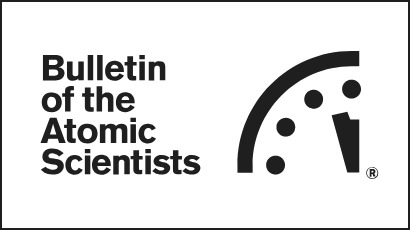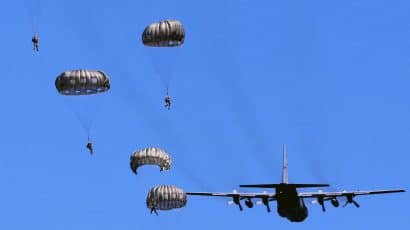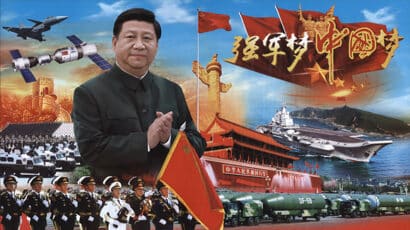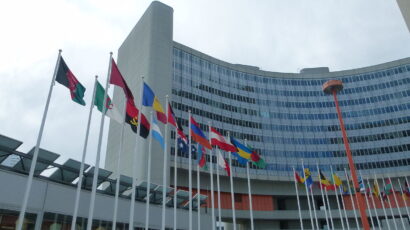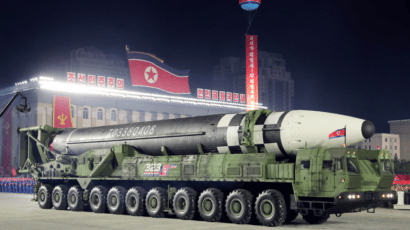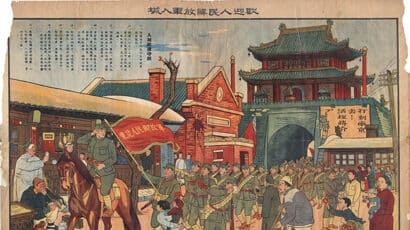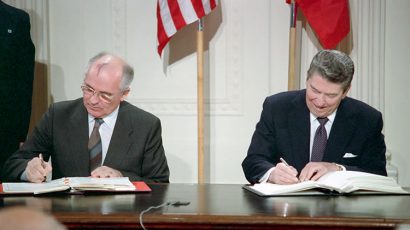Search results for
North Korea and the Clock
When the Bulletin last moved the hand of the Clock closer to midnight in January 2007, we noted our worries about what North Korea's nuclear arsenal might portend for future arms races in Northeast Asia and for further unraveling of the Nuclear Non-Proliferation Treaty (NPT).
A new transatlantic division of labor could save billions every year!
In this article, the author argues for a strategic reconsideration of one major element of the US defense effort—the commitment to the North Atlantic Treaty Organization. He shows how major reforms in the implementation of US alliance commitments can save as much as $70 billion to $80 billion per year with little change in the risk to US interests.
The end of Japan’s nuclear taboo
Ever since the August 1945 atomic bombings of Hiroshima and Nagasaki, the Japanese people have possessed a strong aversion to the idea of nuclear weapons. Public discussion of developing nuclear weapons has been practically nonexistent, and politicians have been chastised for mentioning the topic: As recently as 1999, Japan's vice defense minister resigned after receiving overwhelming criticism for suggesting that Japan should arm itself with nuclear weapons.
The future of GNEP: Next steps
With the global expansion of nuclear energy and the weakening of international rules governing nuclear trade, there's a risk that sensitive fuel-cycle knowledge may spread, allowing more countries to acquire the capabilities to build nuclear weapons. The Bush administration claims that its Global Nuclear Energy Partnership (GNEP) will minimize this risk. Unfortunately, in reality, GNEP has encouraged the spread of the know-how that ultimately could allow many more countries to possess nuclear weapons.
The North Korean nuclear test: The Japanese reaction
Only 50 days ago, Japan called on the U.N. Security Council to condemn North Korea's long-range missile launch. On May 25, Tokyo once again appealed to the Security Council for an emergency meeting to condemn Pyongyang--this time for its second nuclear test and its subsequent launch of three short-range missiles.
Nuclear Roundup: 7/31/2017
A compilation of quality nuclear policy news published on the Web, around the world. North Korea North Korea warns of action against sanctions after ICBM test US bombers fly over South Korea after North’s 2nd ICBM Test Limited options for Trump as North Korea races ahead with nuclear weapons Abe swipes at China, Russia after … Continued
Nuclear-security lessons from Australia
What Canberra has done—and can do—do to keep dangerous radioactive materials out of malicious hands.
Beyond Al Qaeda
Since the attacks of 9/11, the United States has overthrown regimes in two Muslim countries at a cost of trillions of dollars, nearly doubled baseline defense expenditures, run up a massive federal debt, curbed civil liberties at home, violated international law, set up a new cabinet department, and alienated many of our traditional allies. All of this was justified in the name of dealing with what was perceived as the existential threat posed by Al Qaeda.
U.S. misperceptions about the Chinese military
The Pentagon reviews Chinese defense capabilities every year, but that doesn’t mean it draws the proper conclusions.
Turning down the heat between India and Pakistan
The United States has a new best friend, India, and that friend would like the White House to stabilize the subcontinent by putting more pressure on Pakistan to deescalate tensions.
The trouble with Taiwan
There are many dimensions to the unfolding crisis over Taiwan’s future status—and the wisest US policy is one of realism and restraint in order to avert a disaster of global proportions.
The climatic consequences of nuclear war
Although the ongoing Nuclear Posture Review is supposed to include all aspects of the strategy and doctrine that govern the use of U.S. nuclear weapons, it once again will not consider one crucial question: What would be the long-term consequences to Earth's environment if the U.S. nuclear arsenal were detonated during a conflict?
Can Japan become a bridge-builder for nuclear disarmament?
Editor's note: To mark the presidential visit to Hiroshima, we are reprinting this August 2015 Bulletin column. The recent, 70-year anniversaries of the atomic bombings of Hiroshima and Nagasaki offer a sobering opportunity to truly re-examine the real impact of the use of nuclear weapons—and not just take a sanitized view. Because the age of … Continued
Bombs away: Confronting the deployment of nuclear weapons in non-nuclear weapon countries
Nuclear Nonproliferation Treaty members meet in Vienna next week to begin another cycle of assessing progress on nonproliferation and disarmament. A contentious part of the NPT debate will likely involve the NPT countries that do not have nuclear weapons but host nuclear weapons belonging to the United States or Russia, which recently announced it would station nuclear weapons in Belarus.
Nuclear Notebook: How many nuclear weapons does North Korea have in 2022?
This Nuclear Notebook examines North Korea’s nuclear arsenal. The authors cautiously estimate that North Korea may have produced enough fissile material to build between 45 and 55 nuclear weapons; however, it may have only assembled 20 to 30.
To reassure Taiwan and deter China, the US should learn from history
The intricate history between the US and Taiwan suggests that a new and effective US policy toward Taiwan needs to include both credible military deterrence of China and clear reassurances for Taiwan.
What the impending death of the INF teaches about future arms control agreements
While the pros and cons of pulling out of the INF have been thoroughly debated, a subject that has received much less attention is what the impending death of the INF can teach us about future arms control agreements. Specifically, how can future treaties be designed to avoid the fate of the INF?
Fear of false negatives: AI and China’s nuclear posture
Understanding China’s insecurity about being able to detect “bolt-from-the-blue” attacks is crucial for gauging how it may integrate AI and autonomy into its conventional and nuclear platforms— and how the United States should respond.
